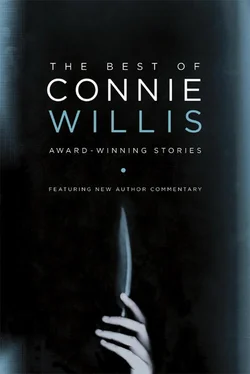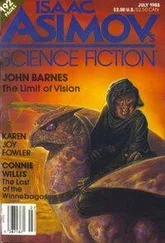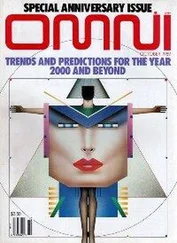And the stories were good . These were, after all, short stories and novelettes and novellas being written by authors at the height of their powers. Nowadays, science-fiction writers tend to think of the short story only as a way to get their foot in the publishing door or as a practice run for the three-volume trilogy they really want to write, and after they sell that first novel, they tend not to write any more short stories.
But back then very few science-fiction novels were being published (they were really days of dark oppression), and everybody , from the talented beginner to old hands like Jack Williamson and Frederik Pohl, was writing for the magazines. Including Heinlein, who I was thrilled to find was also in the collections, with gems like “They” and “All You Zombies”—and my favorite, “The Menace from Earth.”
These were people who really knew how to write, and I reaped the benefit, reading classics like “Evening Primrose” and “Nightfall” and “Vintage Season” and “Ararat.”
Even in this exalted company, some stories stood out as exceptional. One of them was “Lot,” by Ward Moore, which starts out seeming to be a simple tale about a dad packing the family car for a trip and turns into a horrific (and all-too-possible) nuclear nightmare, a story that managed to embody not only the loss of civilization but the loss of our humanity, and one that has reverberated in my mind ever since I read it.
A second standout was Philip K. Dick’s “I Hope I Shall Arrive Soon,” a story about a man in cold sleep traveling to a far distant planet who keeps dreaming his arrival. It deals with an entirely different kind of nightmare, one in which we can no longer tell what’s reality and what’s a dream.
But my favorite had to be Bob Shaw’s “The Light of Other Days,” a simple little tale about a couple driving out to the country on a summer afternoon to buy a piece of window glass for their apartment. It somehow managed to dissect marriage, loss, grief, and the bitter knowledge that technology can be a two-edged sword, all in the space of a few thousand words.
I had had no idea stories could do stuff like this.
I’ve always considered myself incredibly lucky (the “chance” thing again) that I discovered those collections when I did. Heinlein was great, but novels devoted to blasting through space and discovering planets infested with multieyed monsters didn’t have all that much to say to me, and that was what most of the science-fiction novels in my library were about. And the movies were even worse. (We were still years away from Star Wars .)
With only Daring Rangers of the Sky to read and Attack from Venus to watch, my infatuation with science fiction might have proved shortlived. But through the brilliance of Bob Shaw and Philip K. Dick and all those other writers, I’d glimpsed what science fiction could be. So I kept reading, discovering Samuel R. Delany and J. G. Ballard and James Tiptree, Jr., and Howard Waldrop and a host of other brilliant writers, and falling more and more in love with the field. And I started writing stories of my own.
Well, maybe not entirely my own. When I look back at “A Letter from the Clearys,” I can see how much it owes to Ward Moore’s “Lot.” When I reread “Fire Watch,” I see the impact of Heinlein and his hapless heroes on me, and in “Even the Queen” and “At the Rialto” the influence of his breezy style and bantering characters.
But it’s not just those two authors. They all influenced me. They taught me all sorts of techniques I could use in my stories—the onionlike layered revelations of Daniel Keyes, the understated ironies of Kit Reed, the multiple meanings Shirley Jackson could cram into a single line of dialogue. More important, they showed me that a story didn’t have to be all flash and pyrotechnics (though they taught me how to do that, too). They showed me that stories could be told simply and straightforwardly—and have hidden depths.
But mostly they made me fall so madly in love with their stories that I wanted to be just like them, so madly in love that I’ve written science-fiction short stories for more than forty years—and am still writing them.
This year I was honored to be awarded the Grand Master Nebula for my work and my life in science fiction. It is fitting that the award is named after Damon Knight, who wrote several of my favorite short stories in those Year’s Best collections, including “The Country of the Kind” and “The Big Pat Boom,” and I’d like to think I got the award as much for the stories you’ll find in this volume as for my novels.
In my acceptance speech I thanked all of the writers and editors and agents who’ve helped me along the way, and I concluded with this:
But mostly I have to thank the people to whom I owe the most:
—Robert A. Heinlein, for introducing me to Kip and Peewee, and to Three Men in a Boat and to the whole wonderful world of science fiction.
—And Kit Reed and Charles Williams and Ward Moore, who showed me its amazing possibilities.
—Philip K. Dick and Shirley Jackson and Howard Waldrop and William Tenn, who taught me how science fiction should be written.
—And Bob Shaw and Daniel Keyes and Theodore Sturgeon, whose stories—“The Light of Other Days” and “Flowers for Algernon” and “The Man Who Lost the Sea”—taught me to love it.
I wouldn’t be here without them.
I couldn’t have done any of the things I’ve done without them, and in a sense, when you read this collection, you’re reading their stories as well as mine. At least, I hope a little of them has rubbed off on me. Because they were truly the year’s—and any year’s—best. And when my stories are comic and tragic and about everything from Thomas More to Christmas carols, from murder to exasperated mothers, I’m following firmly in their footsteps. And they were following firmly in Shakespeare’s.
So, enjoy! And then, when you’ve read all these stories, go read Philip K. Dick’s “We Can Remember It for You Wholesale” and C. L. Moore and Henry Kuttner’s “Mimsy Were the Borogoves” and Kit Reed’s “Time Tours, Inc.” and Theodore Sturgeon’s “A Saucer of Loneliness.” And all the other wonderful, wonderful stories of science fiction!
Connie Willis
A LETTER FROM THE CLEARYS

There was a letter from the Clearys at the post office. I put it in my backpack along with Mrs. Talbot’s magazine and went outside to untie Stitch.
He had pulled his leash out as far as it would go and was sitting around the corner, half-strangled, watching a robin. Stitch never barks, not even at birds. He didn’t even yip when Dad stitched up his paw. He just sat there the way we found him on the front porch, shivering a little and holding his paw up for Dad to look at. Mrs. Talbot says he’s a terrible watchdog, but I’m glad he doesn’t bark. Rusty barked all the time and look where it got him.
I had to pull Stitch back around the corner to where I could get enough slack to untie him. That took some doing because he really liked that robin. “It’s a sign of spring, isn’t it, fella?” I said, trying to get at the knot with my fingernails. I didn’t loosen the knot, but I managed to break one of my fingernails off to the quick. Great. Mom will demand to know if I’ve noticed any other fingernails breaking.
My hands are a real mess. This winter I’ve gotten about a hundred burns on the back of my hands from that stupid woodstove of ours. One spot, just above my wrist, I keep burning over and over so it never has a chance to heal. The stove isn’t big enough and when I try to jam a log in that’s too long that same spot hits the inside of the stove every time. My stupid brother David won’t saw them off to the right length. I’ve asked him and asked him to please cut them shorter, but he doesn’t pay any attention to me.
Читать дальше













